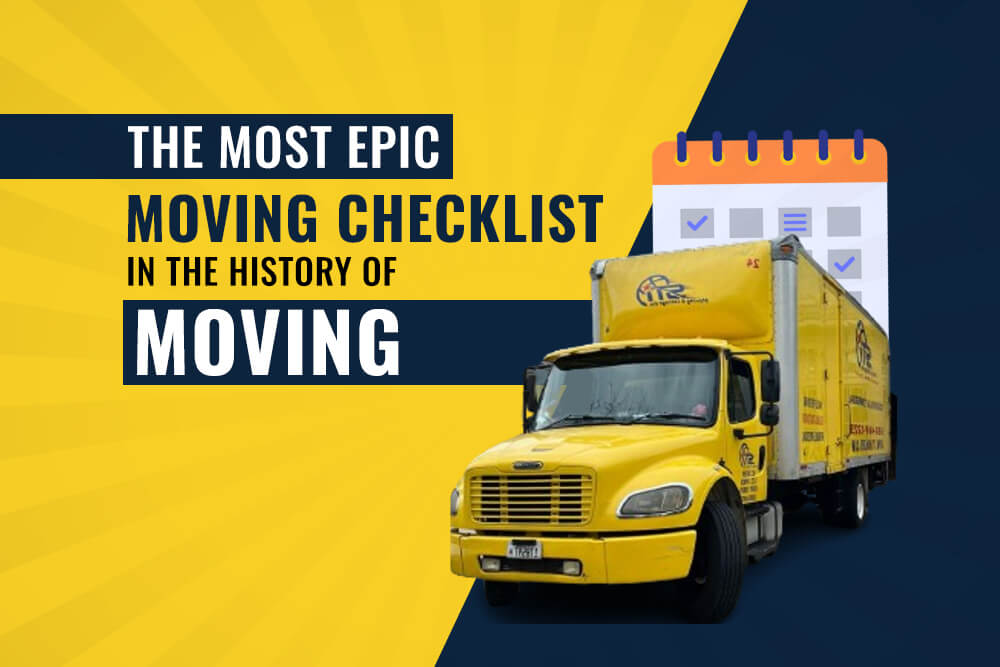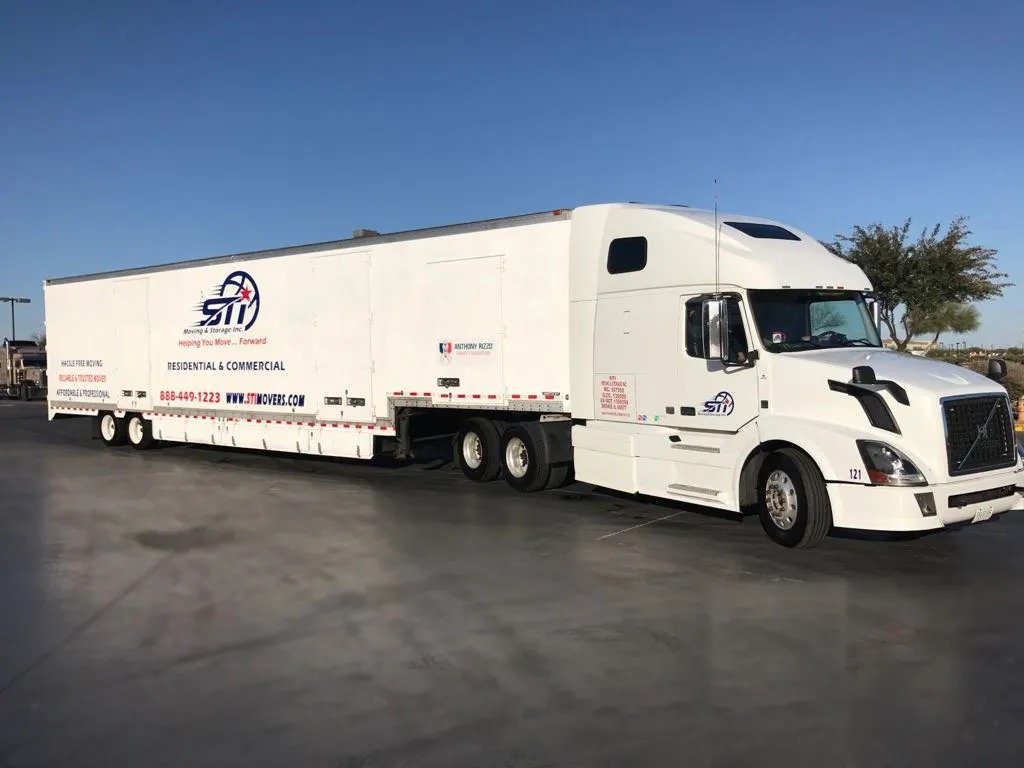Let’s be honest — moving can be a lot to handle. That’s why we’ve created an epic moving checklist to help you stay on track.
This 8-week moving plan covers everything you need to do before, during and after your move. With this guide, you’ll stay organized and make the whole process way less stressful — so you can relax and enjoy your new place.
Before Moving Day
Planning your move well in advance is very important.
There’s a lot to take care of and it can feel like too much. This checklist is here to guide you. If things start to feel out of control, you can use it to get back on track.
The sooner you begin the smoother and less stressful your move will be.
8 Weeks Before Moving Day
You can start getting things ready as early as 8 weeks before your move.
1. Create a Digital Folder for Moving Day
Put all the files related to your move in one folder so everything stays neat and easy to find. It’s better to also save a copy online using services like Google Drive, Dropbox or something similar.
As you go through the process, add pictures of quotes, receipts and other important documents to the folder.
2. Get an Estimate from a Moving Company
Contact at least three moving companies and ask each one for a price estimate. Check which ones offer services that match your budget. Also, make sure they are licensed and insured.
Those who want to move by themselves can start looking into the cost of renting a moving truck and other related expenses.
3. Set a Budget for Moving Expenses
Write down all your upcoming costs and try to save some money early. Having cash ready will make moving day less stressful. If you’re relocating for a job, check if your company will pay for some or all of the costs.
4. Review Documents from the Moving Company
The moving company will give you papers that explain their services and rules. Make sure to read everything carefully before signing and returning them. This helps avoid any surprises on moving day.
If you’re unsure about anything, now is a good time to ask questions.
5. Assess Your New Place
Once you’ve booked a moving company, take time to check out your new place and plan how the move will go.
Which roads should the movers use? Where can they park? Is traffic usually heavy in that area? If you’re moving into an apartment or condo, is there a service elevator they can use? Are there any special moving rules for the building?
Ask yourself these questions before moving day to avoid problems.
6. Request Time Off from Work
If your move is on a weekday, ask for a day off in advance. You might also need time off the day before or after the move. The sooner you request it, the better your chances of getting it approved.
7. Find a School for the Kids
If you have children, start looking into schools in your new area. Websites like Great Schools can help you find good options nearby.
Also, request transcripts from their current school. Sending all the needed documents early will help you get everything sorted before their first day.
8. Get Rid of Stuff you won’t be Bringing with you
Clearing out things you don’t need makes packing easier and helps you see what’s really going with you.
You can give away, sell or donate items you’re not taking. Local charities or shelters are great places to donate.
9. Separate Items that the Movers won’t Handle
There are some things you may not want the movers to take, like valuables, delicate items or things like guns, safes, or artwork. Keep these separate from the rest of your stuff.
At the very least, make a note of what you plan to move yourself.
10. Talk with Your Landlord
If you’re renting, make sure to inform your landlord about your move. Most rentals require you to give notice before leaving. Also, pay any money you still owe to clear things up before you go.
6 Weeks Before Moving Day
With 6 weeks left, it’s time to lock in some final details. It’s also a good time to tell your friends and family about your move. If you won’t see them for a while, plan a small get-together to catch up.
If you need help from friends or family on moving day, ask them now so they can save the date.
11. Talk to Family & Friends About the Move
Let your close friends and family know about your moving plans. If you have kids, talk to them early and explain what will happen on moving day.
It’s also a great chance to spend time with people you might not see for a while.
12. Ask Friends & Family for Help
If you need help with your move, ask your friends or family about 7 weeks ahead. Asking early gives them time to keep that day free.
13. Book a Moving Van
Now’s a good time to reserve a moving van. Look into rental options and choose one that fits your needs and budget.
If you’ll need temporary storage during the move, start checking out those options too.
14. Collect Free Boxes
You can buy boxes for packing, or save money by finding used ones around your area. Local shops like grocery stores, liquor stores, restaurants and office supply stores often have free boxes to give away.
If you still need more, websites like Used Cardboard Boxes sell secondhand, eco-friendly moving box kits.
15. Research Packing Hacks
Just stuffing things into boxes won’t help much. Look up simple packing tips online to help you pack smarter and save space.
This will make things easier and may even cut down the number of boxes you need.
To stay organized, label each box with the room it belongs to. Keep similar items together — like packing all kitchen appliances in the same box.
16. Label Your Boxes
Using color labels can help you quickly see where each box should go when unloading the truck.
Also, clearly mark any boxes with fragile items. Add simple instructions like “this side up” or “handle with care” so movers know how to carry them properly.
17. Create an Inventory of Items
It may take some time but making a list of everything you’re moving can really help. If something goes missing, you’ll know whether you packed it or not.
If your boxes are labeled, you can also note which item is in which box for easy tracking.
18. Take Photos of Your Wiring Setups
If you’re not very tech-savvy, it’s a good idea to take pictures of how your electronics are connected. This will help you set them up quickly in your new home.
You can also label each cable to know where it goes and which device it belongs to — no guessing needed.
19. Disassemble Your Furniture
Start taking apart furniture you won’t need before the move. Keep all screws and small parts in a container or plastic bag.
If there are lots of pieces, group related parts into smaller bags, then put them all in one larger bag.
You can also take photos or videos while taking things apart. This will help you put everything back together more easily later.
20. Make Your Travel Arrangements
If you’re flying, book your tickets early to avoid high prices or full flights. The same goes for renting a car if you need one. Also, confirm hotel bookings if your trip will take more than a day.
Planning ahead saves money and reduces stress. If you’re driving your own car, get it checked and serviced before the trip.
21. Make Minor Home Repairs
If you want your security deposit back, check your place for small fixes that need to be done. This could be things like patching up paint or taking nails out of the walls.
22. Measure Your Furniture
If you’re not sure your furniture will fit through the door, measure it ahead of time — don’t wait until moving day.
Also, plan how to get each piece out of the house. Some items need to be turned a certain way to fit through doors, stairs or hallways.
If something is too big or heavy, make sure to ask someone to help you move it.
23. Research Your New Community for Points of Interest
Learning about your new area early can help you adjust faster. You’ll feel more at home once you move in.
Look up local restaurants, parks, malls and other important places nearby. It’ll make settling in much easier.
24. Pack Items Every Day
Start packing a little each day, focusing on things you don’t use often — like books, wine glasses or jewelry.
By moving day, you’ll be surprised how much you’ve already packed without feeling overwhelmed.
4 Weeks Before Moving Day
With just a month left, you’ll have more tasks to handle.
Now is the time to sort out any important documents. If you still haven’t gotten rid of items you’re not taking, it’s time to do that too.
25. Buy Moving Insurance
Getting moving insurance can help protect your stuff in case anything gets lost or damaged during the move. It’s not required but it can give you peace of mind.
26. Get Rid of Perishable Items
You likely won’t be taking perishable food with you, so plan your meals to use up anything that could spoil.
The same goes for pantry items. Canned goods can be heavy to move in large amounts, so it’s better to use them up or donate them to a local charity.
27. Settle Your Local Memberships
If you’re part of any local clubs or paid memberships, like a gym, now’s the time to cancel them. If you won’t be using them anymore, make sure your accounts are closed or updated.
This is also a good chance to say goodbye to people you may not see again for a while.
28. Gather All Your Records
If you haven’t already, collect all your financial, legal and medical records. Keep them together in a folder and store it somewhere safe and easy to remember.
It’s also a good idea to keep this folder with your birth certificates and passports so all your important documents are in one spot.
29. Notify Your Insurance Company
Let your insurance company know you’re moving so they can update your information and records.
30. Find an Internet Provider
Moving without internet can be frustrating. Contact a provider in your new area and book an installation ahead of time. Appointments fill up quickly, so don’t wait too long.
31. Find a New Doctor, Dentist & vet
If you’re moving to a new city or state, start looking for a new doctor and dentist. It helps to have a few options ready.
If you have pets, find a vet in the new area so you know where to go in case of an emergency. Don’t forget to bring your pet’s medical records with you.
32. Plan Your Route
If you’re moving a long distance, use Google Maps to plan your way. You can make the trip more enjoyable by adding fun stops or landmarks along the route.
2 Weeks Before Moving Day
You’re getting close. Two weeks may feel like enough time but there’s still a lot to handle. Use this time to update your accounts and records, and make sure all the final details of your move are in place.
33. Create a Folder for Bills & Receipts
Along with your digital folder, make a separate folder to keep any receipts and bills from the move. Some of these might be tax-deductible. Check with the IRS to see if your moving costs can be claimed on your tax return.
34. Recycle or Dispose of Flammable, Corrosive & Poisonous Items
This is important. If you have any items that are flammable, toxic or corrosive, make sure to safely get rid of them. You don’t want to leave dangerous materials behind when you move out.
35. Notify Service Providers
Tell your gardener, housekeeper and any other regular service providers that you’re moving. If you won’t need their services anymore, let them know early so they have time to find new work.
36. Set Up Mail Forwarding
If you still get mail through USPS, set up mail forwarding so your mail goes to your new address. You can also get a PO Box near your new home if you need extra time to get settled.
37. Return Borrowed Items from Neighbors, Family & Friends
While packing, you might find things that aren’t yours. Make sure to return anything you borrowed from friends, family or neighbors before you move.
38. Find a Babysitter
If you have a baby, it’s a good idea to arrange for a babysitter at your new place. You’ll be busy unpacking, so having someone look after your child will make things easier.
Even better if a family member can come by to help.
39. Back Up Your Computer
Computers can be tricky to move since they’re sensitive. Before packing yours, back up all your files using an external drive or a cloud service to keep them safe.
40. Take Care of Plants
Many people don’t bring their plants when they move. If you’re leaving yours behind, try to find someone who can take them and give them a good home.
41. Remove Light Bulbs from Lamps
Before packing your lamps, take out the light bulbs so they don’t break during the move. Pack them separately and wrap them well to keep them safe.
42. Update Your Driver’s License
Go to the DMV to change the address on your driver’s license so it shows your new location.
43. Update Your Address on E-Commerce Platforms
Before you move, update your shipping address on sites like Amazon or any other online stores you use. This will help avoid deliveries going to your old home.
44. Transfer Your Prescriptions to a New Pharmacy
If needed, move your prescriptions to a pharmacy close to your new home so you can keep getting your medicine without any trouble.
The Week of Moving Day
The big week is here. Now’s the time to get everything in order—pack up the last of your things, organize what’s left and clean your old place. The sooner you finish these tasks, the easier moving day will be.
45. Get Rid of Leftover Food
If you still have any leftover food, this is the time to throw it out or give it away.
46. Clean Your Old Home
Even though you’re leaving, don’t leave the place messy. Give your old home a good clean before you go — the next person will really appreciate it.
47. Unplug the Fridge
If you have an older fridge, unplug it a day before the move to let it defrost properly.
48. Cancel or Redirect Pending Deliveries
If you’re waiting on any deliveries that won’t arrive before you move, cancel them or have them sent to your new address.
49. Prepare for a Final Walkthrough with your Landlord
Your landlord will likely check the place before you move out. Make sure everything looks good — for example, patch up any holes in the walls and fix anything that needs attention.
50. Check the Weather
Look up the weather forecast for moving day. Be ready to adjust your plans if the weather isn’t ideal.
51. Withdraw Cash
You may need cash on moving day — for things like tipping movers. It’s a good idea to have some ready just in case.
52. Clean your New Place
If possible, visit your new home and give it a good cleaning before you move in.
Moving Day
The big day is here. If you’ve followed your checklist, things should go smoothly. Just make sure to wake up early and start the move as soon as you can.
50. Protect your Floors & Carpets
Be careful not to scratch or damage the floors while moving. Use floor covers or pads to keep them protected.
51. Work with the Movers
Be ready to answer any questions they have. When you get to your new home, tell them where each box and piece of furniture should go. Don’t forget to tip them for their help.
52. Unpack the Essentials
Start by unpacking the most important things, like your bed and toiletries. After a long day of moving, you’ll probably want a shower and some rest.
53. Say Hello to Neighbors
After you settle in, take a moment to say Hi to your new neighbors. It’s a nice way to start off on the right foot.
54. Go Grocery Shopping
Buy some groceries and basic supplies — just enough to get you through the first few days in your new home.
55. Put up Curtains
You’ll want some privacy in your new place, so hang up curtains or window shades as soon as you can.
56. Say Thanks to your Real Estate Broker
It’s a kind thing to do. Let your broker know you appreciate their help and that you love your new home. A simple thank-you note can mean a lot.
After Moving Day
The job isn’t over just because you’ve moved in. There are still things to take care of. Start by unpacking and settling in to make your new place feel like home.
The Week After Moving Day
Here’s what you should take care of during your first week in your new home.
57. Leave your Moving Company a Review
Share your experience by leaving a review for the moving company. Whether it was good or bad, your feedback can help future customers.
58. Clean your New Home
If you haven’t already, clean the carpets in your new place. If there’s a chimney, make sure it’s cleaned before using it.
59. Unpack Everything
Finish unpacking all your things. Set aside the boxes you used — if they’re still in good shape, consider giving them to someone else who’s moving instead of throwing them away.
60. Install a Security System
Set up a security system as soon as you move in. It’s a smart way to keep your new home safe from the start.
61. Explore your New Neighborhood
Take some time to walk around and check out your new area. You may have seen it online but seeing it in person helps you feel more at home.
62. Let your Friends & Family Know you’ve Arrived
Let your friends and family know you made it safely. Also, don’t forget to thank those who helped you pack and move.
Two Weeks After Moving Day
By now, you should be mostly settled in. But there are still a few more things to take care of.
63. Unpack Everything Else
It’s normal to still have some boxes left after a couple of weeks. Take the time to open them and put everything in its proper place.
64. Make Spare Copies of Keys
Make extra keys for people who might need them, like your babysitter, nanny or dog walker.
65. Schedule Painters
If your new home needs a paint job, call a painter for a quote. If you’re not too tired from the move, you can paint it yourself and save some money.
66. Take your Pet to the Vet
Schedule a visit with your new vet so they can meet your pet. Even if it’s just a quick checkup, it’s good to make the introduction.
67. Update your Bank Accounts
Update your bank account with your new address. You can usually do this quickly through online banking.
68. Check the Status of your Security Deposit
If you haven’t gotten your security deposit back yet, reach out to your old landlord to ask about it.
69. Change your Locks
For extra safety, consider changing the locks on your new home. You never know who might still have a copy of the old keys.
70. Understand the Trash Pickup Schedule
Trash pickup days can vary by location, so make sure you learn the schedule for your new area.
71. Check the Smoke Alarms
Put in fresh batteries for all smoke alarms. You might also want to install a carbon monoxide detector for extra safety.
72. Schedule Maintenance Work
Have an electrician check your home’s wiring to make sure everything’s working right. It’s also a good idea to inspect other utilities. You’ll feel more at ease knowing your home is safe and in good shape.
You made it!
That’s it — everything you need to handle before, during and after your move. We hope this guide helped you out.
If there’s something we missed, feel free to share your thoughts. And most of all, congratulations on your new home!
Enjoy the move & your fresh start.











